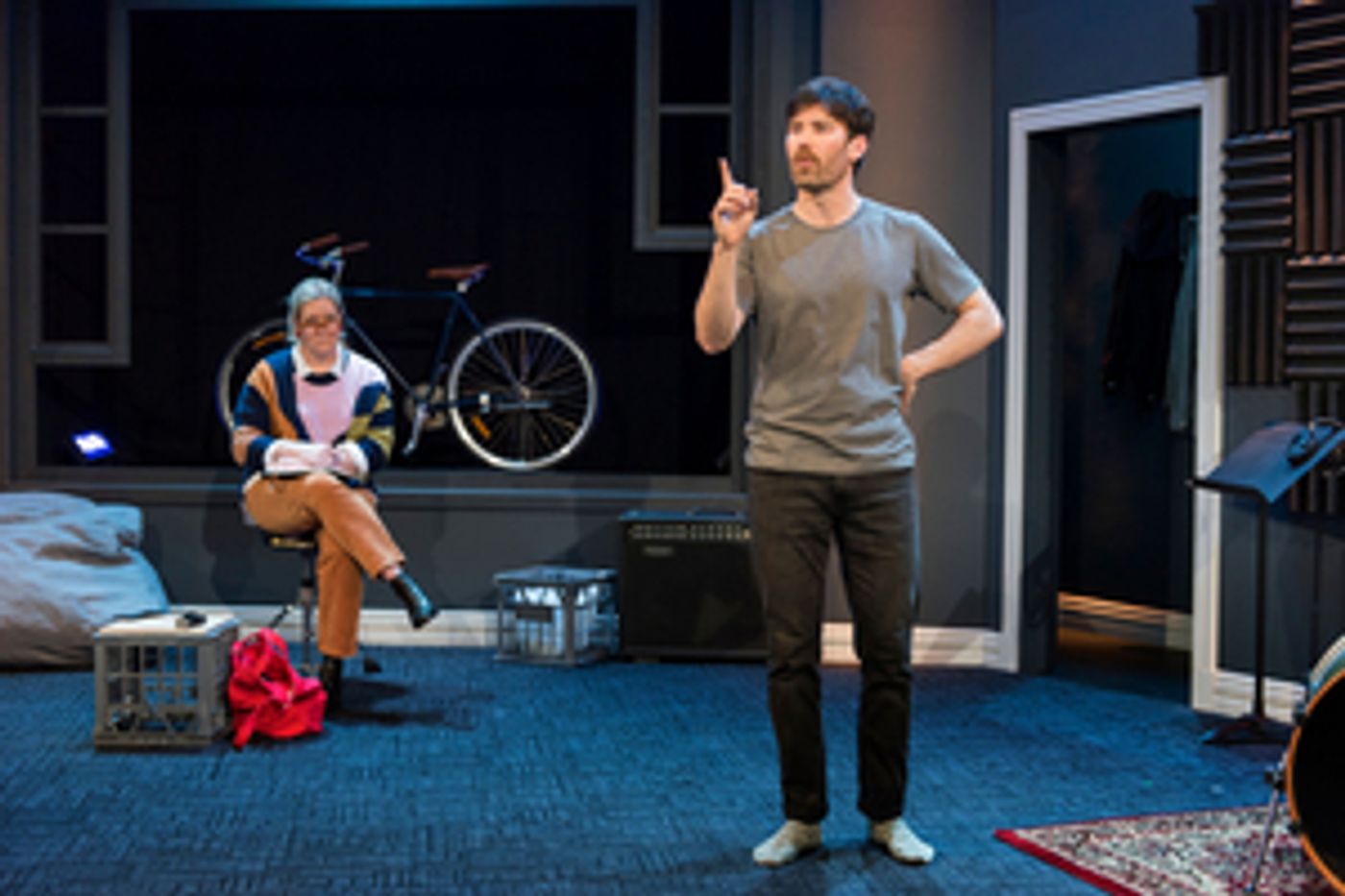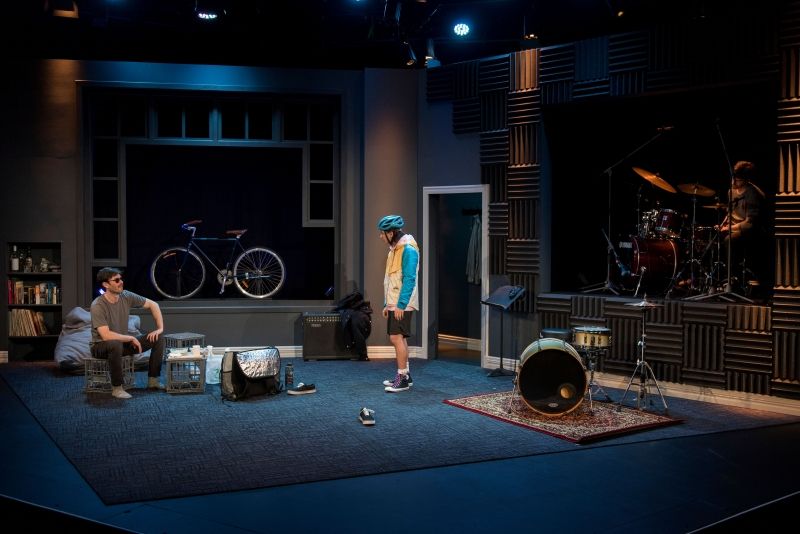Review: MINNEAPOLIS at Subiaco Arts Centre
Will O'Mahony's play about cancel culture and masculinity will make you laugh and make you think.

There is no easy way to describe MINNEAPOLIS, a play by Will O'Mahony that packed Subiaco Arts Centre for each of its performances. It is dramatic, brooding, dark, funny, and confronting at different points and in different measures. The sum of those often-contrasting parts is a brutal and unrelenting look at toxic masculinity, cancel culture, and gender dynamics that brought the audience to laugh, but most importantly, brought them to think.
Will O'Mahony stars in, wrote, and co-directed (alongside Frances Barbe) MINNEAPOLIS. His character, unnamed in the play and only written as Boy is on stage for the full show, is the focal point of the narrative. O'Mahony's portrayal of a person facing the backlash of comments made in private that became very public quickly draws the audience in. The play starts with Boy begging for a video that shows him in a bad light and that is already gaining traction in bringing Boy's life down to be removed from the internet. The waxing and waning desperation of Boy throughout the play is quite relatable. As humans we've all no doubt done things that we've regretted and immediately sought to control the damage. However, O'Mahony's writing and portrayal of the main character ensure that his actions never appear abhorrent but also avoids complete contrition. Just as it seems he is on the verge of genuine remorse, he further drives the sexist stereotypes that he still believes in, highlighted by his increasingly desperate attempts to show that he doesn't believe in them. O'Mahony portrays a deeply problematic and often unlikeable character, but also brings humour and superb timing to a part that is no doubt quite difficult to navigate. See more about the many parts of the show O'Mahony aimed for in the preview.
Opposite O'Mahony as Girl is broadcaster and entertainer Andrea Gibbs. To see such a talented and experienced performer take to the stage is a genuine treat, with Gibbs providing an unwavering counter to Boy's unpredictable changes in mood and hesitancy to stop and think. Gibbs' demeanour throughout the show doesn't change a great deal despite difficult interactions with Boy that swing wildly, during which Girl attempts to both make Boy see the error of his ways whilst also trying to convince him to tell the honest and complete story. Given the many facets of misogyny Boy expresses both casually and deliberately, Gibbs' character offers the feminist viewpoint, eloquent and honest and avoiding lecturing the characters and the audience. Whilst the play never had more than two characters on stage, Gibbs was able to convey the feeling of isolation but also able to interact with the audience, whether it be a well-timed look, sigh, or her role as de facto narrator to illustrate the timeline of the play. Her many contrasts with Boy really drove the story and it was a delight to see Gibbs in her element. Girl developed her own narrative within the story, and whilst it was not highlighted until the very end, when reflecting on the show one could find the many clues Gibbs included to her own struggles within the play.

Alongside the experience of O'Mahony and Gibbs was the newcomer Tobias Muhafidin as the food delivery driver and Boy's only friend. Muhafidin was also tasked with portraying a character with many layers and he did so superbly, delivering jokes to maximum effect whilst also showing outstanding maturity to temper Boy's wild moods at times. Like O'Mahony, though, Muhafidin also had to express misogyny and sexism, but his journey of both teaching Boy and learning from him really got the audience on board. The delivery driver develops his own narrative as the play progresses and despite his youth, Muhafidin superbly portrayed a vulnerable and emotional character whilst also reflecting on the many troubles of male adolescence.

Slightly off-stage throughout was drummer Liam Hickey, who, far from simply adding music, was a representation of Boy's state of mind. Not only did Hickey set the mood in each transition, varying the levels of refinement and noise in his drumming to reflect Boy's mood, he also added expressions and posture to truly reflect Boy's psyche, sitting straight and smiling when Boy thought he was doing the right thing, to hunching and frowning when it was shown that Boy was in the wrong. Hickey was never highlighted as playing these parts, Boy only directly interacting with him early in the second act, but for anyone who looked Hickey was able to add humour and understanding to the show with his subtle changes.
The only staging throughout the show is Boy's living room, which changes with his mood and as the ten days the narrative takes place over. With just three and a half characters and one set, co-director (along with Will O'Mahony) Frances Barbe still manages to pack the show with meaning and emotion. The transitions between scenes were well choreographed to keep the show moving, utilize the actors on stage, and reflect Boy's changing moods, whilst each character delivered their parts perfectly, addressing the other characters and the audience as needed. Indeed, whenever Boy was being called out, he stood between the other character and drummer Liam Hickey, meaning the lesson was delivered to both Boy and his state of mind. The final scene sees Girl begin in the audience whilst Boy, alone on stage and in conscience, calmly and honestly (yet still with his faults clear to see) as Girl to be both understanding of him whilst being truthful when she shares Boy's story with the world. By sending the statement into the audience, Boy gives the world a frank admission of masculinity as it is today; deeply insecure, full of faults, but recognizing there is a great deal of work to do. Girl's final lesson in the same scene sees the roles reversed, with Girl on stage and Boy at the very edge, only partially lit and again being part of the audience. This means that the final monologue, a raw and powerful counter to Boy's definition of masculinity, full of all-too-common highlights of how deep sexism is in society is delivered to the audience as much to the onstage characters.

Whilst there is much to say off the messages within MINNEAPOLIS, at no point does it preach, preferring to simply present the facts and allow the audience to make up its mind. This is also the case for many plot points and changes and character evolutions throughout the narrative, with these being left to the audience to realise, rather than the play directly pointing them out. As different perspectives and moods come and go, there are more things within the play to look at and consider as the story progresses. Overall, MINNEAPOLIS is an incredibly clever and thought-provoking illustration of masculinity and cancel culture, never preaching a point of view but instead inviting the audience to consider the many points point forward to reach their own conclusion. The small cast, led by writer Will O'Mahony, deliver an excellent show with relationships on stage altering and progressing thanks to superb acting from the whole cast. There are moments where you will laugh deeply, but more importantly, moments where you will think deeply and reflect on the world as it is. It's important that the stories within this play are told, and the way MINNEAPOLIS tells means it deserves to be told again in future.
Image credit: Christophe Canato
Reader Reviews

Videos

